Racism may hit finances of U.S. companies, but does that make a difference?
By Barrington M. Salmon -Contributing Writer- | Last updated: Jun 13, 2018 - 4:12:41 PMWhat's your opinion on this article?
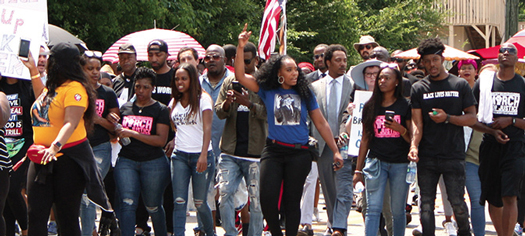
Chikesia Clemons and supporters proceed with protest near a Waffle House. Ms. Clemons was wrestled to the ground by police and violently arrested April 22 at a Waffle House in Alabama. Photo: Jay Buckner/Xcintric Media Group
|
On occasion, overt racists like Roseanne Barr get punished following public outrage and pay a cost for their ignorance. Or you will see an incident such as the one that occurred at a Philadelphia Starbucks when two innocent Black men were arrested while waiting for a colleague without buying something. Corporate leadership responded by firing the employee who called the cops and closed all 8,000 U.S. coffee shops for a half-day race workshop for 175,000 employees.

Protesters have called for a boycott of Waffl e House in the aftermath of several incidents involving Black patrons who have had police called on them by employees resulting in arrests and other racially-charged incidents.
|
Every day, we see and hear incidents of walking, working or driving while Black and other egregious examples of racial profiling and casual racism. But as cell phone cameras and social media continue to expose police brutality, harassment and injustices, the demand from Black people and conscious allies is for significant and substantial change.
But as long as the White majority enjoys power, perks and privilege, killing racism, discrimination and inequality will continue to be hard-won as the cultural battle rages on for America’s soul.
In the midst of this racial unrest and upheaval, the question lingers: What is the cost, if any, of racism to citizens and corporate America?
Rebecca McCray of Takepart, notes that a 2013 study from the W.K. Kellogg Foundation indicates that the income gap created by racism costs the U.S. $1.9 trillion a year. And another study, The Business Case for Racial Equity which focused on the intersection of race, class, residential segregation, and income disparity, found that if racial income inequality was eliminated, the purchasing power of minorities would increase from $4.3 trillion to $6.1 trillion by 2045.
“There is a price to be paid financially and in terms of ongoing employment for the cases we hear about,” said D.C. attorney A. Scott Bolden. “We should be more concerned, however, about what we don’t know about. There are far more incidents that go unseen, unreported and unresolved.”
Mr. Bolden, a frequent contributor to CNN and Fox News on legal and political issues, said “Whites are taught by their family and their outside environment. Discrimination, racism and hatred are learned from families and the community.”
Rashad Robinson, executive director of Color of Change, said unrelenting pressure in the form of protests, petitions, confrontation and dialogue are keys to his organization’s game plan. For the past 13 years, Color of Change has been applying pressure on corporations, politicians and other instruments of racism and oppression in an effort to end practices that unfairly hold Black people back and champions solutions that take society forward.

|
Mr. Robinson said the social environment has changed a great deal over the past 10 years but cautions that corporations haven’t changed but corporate leaders are nervous about the consequences of doing nothing.
“Decision makers have to lose jobs and money otherwise, little changes,” Mr. Robinson said. “This is as much about attracting talent and making space. Corporations will do as much as they have to. If a corporation acts quickly, it probably didn’t do all it could. We have to push, pressure them. Things have to keep becoming more. We have to push for people and corporations to take a side because the status quo will always be against us.”
According to Reuters, the “Roseanne” revival had aired only nine episodes and generated $22.8 million from advertisers, or 2.5 percent of ABC’s ad revenue for the 2017-2018 season, according to data from measurement firm iSpot.
The network had ordered a new season that was expected to run for 13 episodes. Potential ad dollars from those airings would have been as much as $60 million, research firm Kantar Media estimated, Reuters reported.
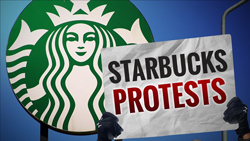
Starbucks closed all 8,000 of its U.S. locations to conduct anti "racial bias" training for its employees in the aftermath of police handcuffing two Black men at a Philadelphia location who were there meeting a business associate and had not ordered anything. Protesters called for a boycott of the coffee chain.
|
Earlier this year, retail giant Target, agreed to a $3.7 million settlement of a lawsuit that alleged the company’s criminal background check process was biased against thousands of Latinos and Blacks seeking jobs with the retailer, noted USA Today.
Several banking institutions over the years have been slammed for racial discriminatory practices against Blacks and Latinos including Bank of America and Wells Fargo. Bank of America was fined $2 million back in 2013 for discriminating against Black job applicants for over 20 years. The same year, Merrill Lynch settled for $160 million as the result of a class action lawsuit brought by Black brokers back in 2005.
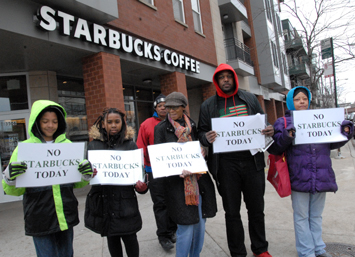
Protestors outside a Starbucks location on the South Side of Chicago. Photo: Haroon Rajaee
|
Advisors for Wells Fargo were hit with a $35.5 million blow to settle a class action discrimination lawsuit from Black financial advisors in January. The suit alleged among other things that Black brokers with Wells Fargo were denied business opportunities and excluded from high-producing teams because of their race, reported advisorhub.com, an online business and trade industry website.
When companies shell out millions settling racial discrimination lawsuits, terminating the employment of perpetrators of racial injustice or offensive remarks, any substantive changes or implementation of new corporate policies and procedures to effectively produce a different outcome, remains to be seen.
Eddie Glaude, Jr., professor of Religion and African-American Studies at Princeton University, expressed the precarious position many Blacks in America find themselves. Racism, he asserts, is deeply insidious and borderline evil.
“For a lot of Black folks in this country, it seems as if, in the generality that White people have lost their damn minds and we have to raise our children in the midst of this,” said Prof. Glaude on MSNBC’s Deadline White House recently. “We have those two Black men in Starbucks, they were somebody’s babies even though they were grown men. That child that that police officer held up by his feet, at the Waffle House, that’s somebody’s child.”
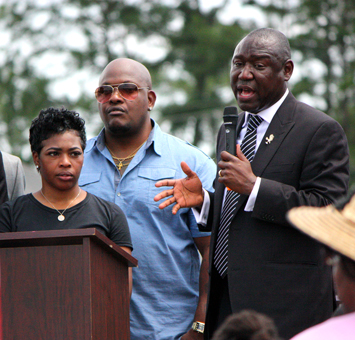
Chikesia Clemons, her father and Attorney Benjamin Crump at rally in support of Ms. Clemons, who was manhandled and arrested by police at a Waffl e House restaurant in Alabama. Photo: Jay Buckner/Xcintric Media Group
|
Prof. Glaude, author of “Democracy in Black: How Race Still Enslaves the American Soul,” added: “It’s not just simply Donald Trump, it’s about the moral monsters that are running around this country and claiming it as their own.”
Since New York businessman Donald Trump announced his intention to run for president at Trump Tower in New York City on June 16, 2015, and a declaration to Make America Great Again, he has unleashed a racial maelstrom where racists feel emboldened, are acting out their racial animus and hostilities, and Blacks, Latinos, immigrants and other non-Whites are targeted by hostile administration executive orders, actions and policy prescriptions.
Earlier this year, at a Washington, D.C. event, Rev. William Barber, II told the audience that Trump isn’t the problem. He’s merely a symptom of America’s moral sickness, and evidence that America is in the midst of a third “Reconstruction.”
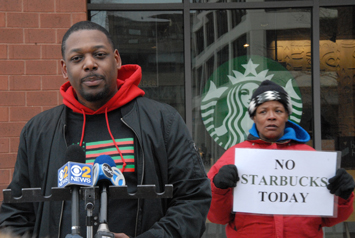
Chicago Starbucks protester speaks to media in aftermath of nationwide demonstrations. Photo: Haroon Rajaee
|
“Those who embrace the Make America Great Again slogan are willing to work hard and cheat to undermine what is evolving in America,” said Mr. Barber, a prominent national activist and an unapologetic voice of resistance to this administration’s hard move to the right. “This is White hegemony and White nationalism strengthened by enormous wealth.”
Amy C. Waninger describes racism as a deep and entrenched issue and characterized its ill-effects as “a tragedy.” She echoed the thoughts of other interviewees who contend that the United States is paying a huge price economically, socially, psychologically and in other undetected ways.
“We have many real problems in society. But all these other problems we create overshadows and takes time and effort from us dealing with those issues that are more important,” she said. “We all share a common humanity and a common fate in all this. The fact that we can’t see each other as neighbors is tragic.”
Ms. Waninger, founder and CEO of Lead at Any Level, which promotes in-the-trenches leadership, diversity, inclusion, and career management—said Americans have to think in terms of the talent, opportunities and societal contributions lost because of pervasive racism, discrimination and structural inequities that favor and benefit White people.
“How many people are there in prisons and marginalized who have the potential to be great corporate leaders?” she asked. “We’re missing out and can’t see the damage racism causes. The racial undercurrent has always been there. It was hard to quantify, was in the shadows, and people would operate at a bare minimum not to be hostile. I’m glad, in a way, that it’s out in the open.” America has never reconciled racism, she said.
“I think of racism as a system of power that accrues benefits to White people. People think it’s saying terrible things but it is an underlying system of economics and a system of privilege,” said Karen Fleshman a San Francisco-based antiracism educator and founder of Racy Conversations. “Some are paying the cost like Roseanne Barr, but when you look overall, no, they’re not paying. Look at the NFL protests, Waffle House and police in Alabama saying the officers’ response was perfectly fine. Until we have public officials who believe in anti-racism, little will change.
“People have done everything they possibly can. They’ve spoken out, demonstrated, expressed themselves repeated and clearly. People in power have to respond,” she continued.
Ms. Fleshman, an attorney and activist, said Blacks, at tremendous personal risk, fought to change legislation during the new Civil Rights movement, yet 50 years later, those hard-earned gains are threatened and being eroded by a hostile administration.
“I’m very glad to see what happened at Starbucks. It’s a step in the right direction,” she said. “It was happy to see but change doesn’t come from a three-hour workshop.” (Final Call staff contributed to this report.)
INSIDE STORIES AND REVIEWS
-
-
About Harriett ... and the Negro Hollywood Road Show
By Rabiah Muhammad, Guest Columnist » Full Story -
Skepticism greets Jay-Z, NFL talk of inspiring change
By Bryan 18X Crawford and Richard B. Muhammad The Final Call Newspaper @TheFinalCall » Full Story -
The painful problem of Black girls and suicide
By Charlene Muhammad -National Correspondent- » Full Story -
Exploitation of Innocence - Report: Perceptions, policies hurting Black girls
By Charlene Muhammad -National Correspondent- » Full Story -
Big Ballin: Big ideas fuel a father’s Big Baller Brand and brash business sense
By Bryan Crawford -Contributing Writer- » Full Story






 Click Here Stay Connected!
Click Here Stay Connected!








